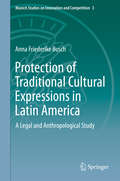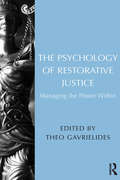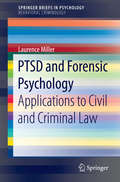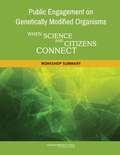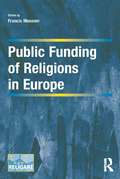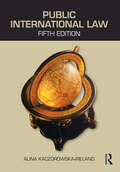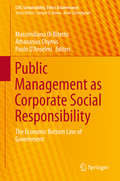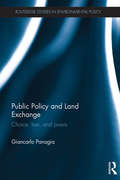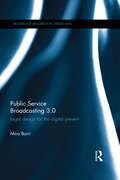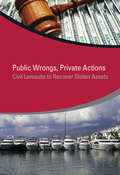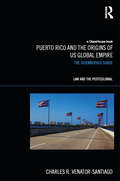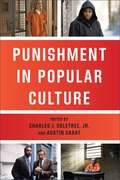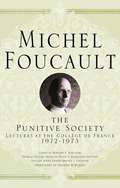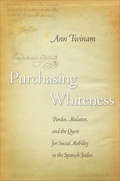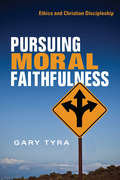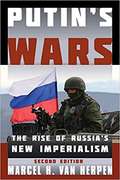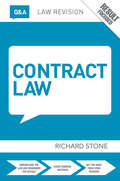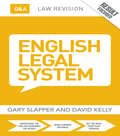- Table View
- List View
Property, Predation, and Protection
by Stanislav MarkusWhat threatens the property rights of business owners - and what makes these rights secure? This book transcends the conventional diagnosis of the issue in modern developing countries by moving beyond expropriation by the state ruler or by petty bureaucratic corruption. It identifies "agent predation" as a novel threat type, showing it to be particularly widespread and detrimental. The book also questions the orthodox prescription: institutionalized state commitment cannot secure property rights against agent predation. Instead, this volume argues that business actors can hold the predatory state agents accountable through firm-level alliances with foreign actors, labor, and local communities. Beyond securing ownership, such alliances promote rule of law in a rent-seeking society. Taking Russia and Ukraine between 2000 and 2012 as its empirical focus, the book advances these arguments by drawing on more than 150 qualitative interviews with business owners, policy makers, and bureaucrats, as well as an original large-N survey of firms.
Prosecuting Maritime Piracy
by Scharf, Michael P. and Newton, Michael A. and Sterio, Milena Michael P. Scharf Michael A. Newton Milena SterioThis book addresses maritime piracy by focusing on the unique and fascinating issues arising in the course of domestic piracy prosecutions, from the pursuit and apprehension of pirates to their trial and imprisonment. It examines novel matters not addressed in other published works, such as the challenges in preserving and presenting evidence in piracy trials, the rights of pirate defendants, and contending with alleged pirates who are juveniles. A more thorough understanding of modern piracy trials and the precedent they have established is critical to scholars, practitioners, and the broader community interested in counter-piracy efforts, as these prosecutions are likely to be the primary judicial mechanism to contend with pirate activity going forward.
Protection of Traditional Cultural Expressions in Latin America
by Anna Friederike BuschThis book analyses the topic of protecting traditional cultural expressions (TCEs) in Latin America. It questions classic legal approaches and involves the interface of anthropology and law. The study analyses regional, national and local particularities of law on paper and law in reality. It includes personal fieldwork research in selected countries and puts light on the political, socio-economic and environmental dimension of the topic. Based upon these insights, the study gives recommendations for a more enhanced, interdisciplinary understanding and protection of TCEs. Latin America is (still) rich of cultural traditions and bio- and sociodiversity. This region is the cradle of the international discussion on protecting TCEs. The national situations are diverse and allow conclusive comparisons. Some countries have established concrete protection systems, like Panama, and made useful experiences. It is time to resume: What do TCEs really mean? Should they be protected by law and if so, how? What can we learn from the practical experiences made so far? The following is clear: The true test for any new legislation - in Latin America and elsewhere - is its impact on the everyday life.
Protective Services
by Joyce LibalNot every child is lucky enough to live in a safe, loving home. Many young people live in difficult, unhealthy, or even dangerous conditions. Luckily, there are systems in place to help kids caught in theses situations. Child protective services are working hard to help children in need. Ryan Delaney is one of these kids. He spends most of his time living in a fantasy world, because that's easier than facing his real life. He lies to his friends about his parents and his home--but eventually, the truth catches up with him, forcing him to get the help he needs. As you read Ryan's story, you will learn about the history of the child protective services and find out about the programs and services offered today.
Psychische Gefährdungsbeurteilung: Impulse für den Mittelstand (essentials)
by Simon HahnzogDieses Essential klärt grundlegend über Hintergründe und Gestaltungsmöglichkeiten einer psychischen Gefährdungsbeurteilung auf und gibt praxisrelevante Impulse zur erfolgreichen Umsetzung, insbesondere in mittelständischen Unternehmen. Seit 2014 sind alle deutschen Unternehmen im Rahmen des Arbeitsschutzgesetzes zu einer Beurteilung der psychischen Gefährdungen ihrer Beschäftigten und zur Gestaltung entsprechender Maßnahmen verpflichtet. Im Falle der psychischen Erkrankung eines Beschäftigten aufgrund übermäßiger beruflicher Belastung drohen dem Arbeitgeber ansonsten Regressforderungen der Sozialversicherungsträger. Einführungen in die Betriebliche Gesundheitsförderung und das Feld der psychischen Erkrankungen bilden den Rahmen für eine fundierte Anwendung der Erkenntnisse.
The Psychology of Restorative Justice: Managing the Power Within
by Theo GavrielidesThis ground-breaking collection dares to take the next step in the advancement of an autonomous, inter-disciplinary restorative justice field of study. It brings together criminology, social psychology, legal theory, neuroscience, affect-script psychology, sociology, forensic mental health, political sciences, psychology and positive psychology to articulate for the first time a psychological concept of restorative justice. To this end, the book studies the power structures of the restorative justice movement, the very psychology, motivations and emotions of the practitioners who implement it as well as the drivers of its theoreticians and researchers. Furthermore, it examines the strengths and weakness of our own societies and the communities that are called to participate as parties in restorative justice. Their own biases, hunger for power and control, fears and hopes are investigated. The psychology and dynamics between those it aims to reach as well as those who are funding it, including policy makers and politicians, are looked into. All these questions lead to creating an understanding of the psychology of restorative justice. The book is essential reading for academics, researchers, policymakers, practitioners and campaigners.
PTSD and Forensic Psychology
by Laurence MillerIn World War I, they spoke of shell shock. By World War II, the term was battle fatigue. Modern understanding of trauma psychology has evolved to give the concept a non-military name: posttraumatic stress disorder. As such, it has been at the heart of civil and criminal cases from workers' compensation to murder. PTSD and Forensic Psychology brings its topic into real-world focus by examining posttraumatic stress as a clinical entity and taking readers through the evaluation process for court cases involving the PTSD syndrome. This timely reference differentiates between PTSD and disorders that may be mistaken for it, and demonstrates its legal application in seeking civil damages and mounting a criminal defense. An evidence-based framework for conducting a trial-worthy evaluation and guidelines for establishing strong cases and refuting dubious ones further illustrate the protocols and challenges surrounding the status of PTSD in legal settings. For maximum usefulness, the book offers courtroom advice for expert witnesses as well as "practice points" at the end of each chapter. Featured topics include: History of the PTSD concept and its relation to the law. PTSD as syndrome: symptoms, diagnosis, treatment. PTSD and other traumatic disability syndromes. PTSD in the civil litigation and criminal justice systems. PTSD as an insanity defense and in claims of diminished capacity. PTSD cases: evaluation, interpretation, testimony. This thorough yet concise analysis makes PTSD and Forensic Psychology the ideal training tool for beginning mental health expert witnesses, as well as a concise practical review and reference source for seasoned forensic psychologists. It will also serve as a useful practice and teaching guide for attorneys, medical rehabilitation professionals, military personnel, psychotherapists, researchers, and educators in the fields of clinical and forensic psychology, criminology, traumatic stress studies, and mental health law.
Public Engagement on Genetically Modified Organisms: A Workshop Summary
by Holly RhodesThe National Research Council's Roundtable on Public Interfaces of the Life Sciences held a 2-day workshop on January 15-16, 2015, in Washington, DC to explore the public interfaces between scientists and citizens in the context of genetically engineered (GE) organisms.<P><P> The workshop presentations and discussions dealt with perspectives on scientific engagement in a world where science is interpreted through a variety of lenses, including cultural values and political dispositions, and with strategies based on evidence in social science to improve public conversation about controversial topics in science. The workshop focused on public perceptions and debates about genetically engineered plants and animals, commonly known as genetically modified organisms (GMOs), because the development and application of GMOs are heavily debated among some stakeholders, including scientists. For some applications of GMOs, the societal debate is so contentious that it can be difficult for members of the public, including policy-makers, to make decisions. Thus, although the workshop focused on issues related to public interfaces with the life science that apply to many science policy debates, the discussions are particularly relevant for anyone involved with the GMO debate. "Public Engagement on Genetically Modified Organisms: When Science and Citizens Connect" summarizes the presentations and discussion of the workshop.
Public Funding of Religions in Europe (Cultural Diversity and Law in Association with RELIGARE)
by Francis MessnerThis collection brings together legal scholars, canonists and political scientists to focus on the issue of public funding in support of religious activities and institutions in Europe. The study begins by revolving around the various mechanisms put in place by the domestic legal systems, as well as those resulting from the European law of human rights and the law of the European Union. It then goes on to look at state support and particular religious groups. The presentation of European and national law is supplemented by theoretical and interdisciplinary contributions, with the main focus being to bring into discussion and map the relationship between the funding of religions and the economy and to infer from it an attempt at a systematic examination or theorization of such funding. This collection is essential reading for those studying Law and Religion, with particular focus on the countries of the UK, France, Belgium, Germany, Italy, The Netherlands, Spain and Turkey. The views expressed during the execution of the RELIGARE project, in whatever form and or by whatever medium, are the sole responsibility of the authors. The European Union is not liable for any use that may be made of the information contained therein.
Public International Law
by Alina Kaczorowska-IrelandThe 5th edition of Public International Law continues the book's accessible, student-friendly tradition with a writing style that is both conversational and easy to read. Features designed to support learning include highlighted key cases, introductory chapter overviews, and end-of-chapter aides-mémoire and recommended further reading. Public International Law is unique in that it is both a textbook and a casebook. The facts of each case and the details of the court or tribunal's decision are succinctly set out, followed by detailed commentary from the author, and, where appropriate, a brief explanation of subsequent events. The book covers all the major areas of public international law, and takes account of new developments relating to the codification of international law by the International Law Commission, State practice, and decisions of international courts and tribunals, in particular those of the International Court of Justice. Features new to this edition: A new dedicated chapter on the law of the sea Diagrammatic aides-mémoire at the end of each chapter Expanded coverage of the US approach to international law via its courts and executive. This book is an ideal learning tool for students of law or political science and provides a clear and straight-forward overview for anyone with an interest in the subject. Alina Kaczorowska-Ireland is Professor of International and EU Law at the University of the West Indies, Cave Hill Campus, Barbados. She is also author of the Routledge textbook, EU Law.
Public Management as Corporate Social Responsibility
by Massimiliano Di Bitetto Athanasios Chymis Paolo D'AnselmiThis collection of case studies in public management bridges the gap between mainstream CSR - confined to the for-profit corporations -and the vast bodies of workers and organizations that make up government and its public administration. The variety and discretion of managerial endeavours in public management calls for accountability and responsibility of government beyond current legal instruments: The book argues that CSR must be brought to bear with government. In government in fact, knowledge management is not a linear process, but the result of working with passion of the parts, implying discretionary behaviour and creativity which in turn imply choice and responsibility. Cases ranging from the USA to Central America, New Zealand and Europe all confirm the complex nature of public management, entailing partnership synergy for disaster recovery, the intertwined link between management and new technology and mindfulness at individual level. The cases are set in a framework by theoretical essays on bureaucratic behaviour and unknown stakeholders.
Public Policy and Land Exchange: Choice, law, and praxis (Routledge Studies in Environmental Policy)
by Giancarlo PanagiaThis original contribution to the field is the first to bring economic sociology theory to the study of federal land exchanges. By blending public choice theory with engaging case studies that contextualize the tactics used by land developers, this book uses economic sociology to help challenge the under-valuation of federal lands in political decisions. The empirically-based, scholarly analysis of federal-private land swaps exposes serious institutional dysfunctions, which sometimes amount to outright corruption. By evaluating investigative reports of each federal agency case study, the book illustrates the institutional nature of the actors in land swaps and, in particular, the history of U.S. agencies’ promotion of private interests in land exchanges. Using public choice theory to make sense of the privatization of public lands, the book looks in close detail at the federal policies of the Bureau of Land Management and the U.S. Forest Service land swaps in America. These pertinent case studies illustrate the trends to transfer federal lands notwithstanding their flawed value appraisals or interpretation of public interest; thus, violating both the principles of equality in value and observance of specific public policy. The book should be of interest to students and scholars of public land and natural resource management, as well as political science, public policy and land law.
Public Purpose in International Law
by Pedro J. Martinez-Fraga C. Ryan ReetzThis text explores how the public purpose doctrine reconciles the often conflicting, but equally binding, obligations that states have to engage in regulatory sovereignty while honoring host-state obligations to protect foreign investment. The work examines the multiple permutations and iterations of the public purpose doctrine and concludes that this principle needs to be reconceptualized to meet the imperatives of economic globalization and of a new paradigm of sovereignty that is based on the interdependence, and not independence, of states. It contends that the historical expression of the public purpose doctrine in customary and conventional international law is fraught with fundamental flaws that, if not corrected, will give rise to disparities in the relationship between investors and states, asymmetries with respect to industrialized nations and developing states, and, ultimately, process legitimacy concerns.
Public Service Broadcasting 3.0: Legal Design for the Digital Present (Routledge Research in Media Law #8)
by Mira BurriThe digital media environment is characterized by an abundance and diversity of content, a multiplicity of platforms, new modes of content production, distribution and access, and changed patterns of consumer and business behaviour. This has challenged the traditional model of public service broadcasting (PSB) in diverse ways. This book explores whether and how PSB should adapt to reflect the conditions of the digital media space so that it can effectively and efficiently continue to serve its public mandate. Drawing on literature on media governance in media and communication science, public international law as well as discussions on cyberlaw, Mira Burri maps and critically analyses existing policy and scholarly debates on PSB transformation. She challenges some of conventional rationales for reform, identifies new ones, as well as exposes the limitations placed upon existing and future policy solutions by global media governance arrangements, especially in the fields of trade, copyright and Internet governance. The book goes on to advance a future-oriented model of Public Service Media, which is capable of matching an environment of technological and of governance complexity. As a work that explores how public interest objectives can be pursued efficiently and sustainably in the digital media ecology, this book will be of great interest and use to students and researchers in media law, information technology law, and broadcast media studies, as well as to policy-makers.
Public Services in EU Law
by Wolf SauterIn the EU public services, utilities and welfare services can be seen as both building blocks for the internal market and as a persistent irritant in the integration process. This book provides a comprehensive overview of the EU law on public services within the context of European integration. It brings together important analysis of the primary Treaty law, mainly on the internal market and competition, and of the secondary legislation at EU level, including different sector specific regimes. Particular attention is given to case law of the EU courts. This will be essential reading for those looking to have a broader understanding of the subject.
Public Wrongs, Private Actions
by Emile van der Does de Willebois Jean-Pierre Brun Mahesh Uttamchandani Sarah Jais Jeanne Hauch Pascale Helene Dubois Yannis Mekki Katherine Rose Sylvester Anastasia SotiropoulouOver the last decade, the topics of corruption and recovery of its proceeds have steadily risen in the international policy agenda, with the entry into force of the United Nations Convention against Corruption (UNCAC) in 2005, the Arab Spring in 2011, and most recently a string of scandals in the financial sector. As states decide how best to respond to corruption and recover assets, the course of action most often discussed is criminal investigation and prosecution rather than private lawsuits. But individuals, organizations, and governments harmed by corruption are also entitled to recover lost assets and/or receive compensation for the damage suffered. To accomplish these goals of recovery and compensation, private or 'civil' actions are often a necessary and useful complement to criminal proceedings. This study explores how states can act as private litigants to bring lawsuits to recover assets lost to corruption.
Puerto Rico and the Origins of U.S. Global Empire: The Disembodied Shade (Law and the Postcolonial)
by Charles R. Venator-SantiagoDrawing on a postcolonial legal history of the United States’ territorial expansionism, this book provides an analysis of the foundations of its global empire. Charles R. Venator-Santiago argues that the United States has developed three traditions of territorial expansionism with corresponding constitutional interpretations, namely colonialist, imperialist, and global expansionist. This book offers an alternative interpretation of the origins of US global expansion, suggesting it began with the tradition of territorial expansionism following the 1898 Spanish–American War to legitimate the annexation of Puerto Rico and other non-contiguous territories. The relating constitutional interpretation grew out of the 1901 Insular Cases in which the Supreme Court coined the notion of an unincorporated territory to describe the 1900 Foraker Act’s normalization of the prevailing military territorial policies. Since then the United States has invoked the ensuing precedents to legitimate a wide array of global policies, including the ‘war on terror’. Puerto Rico and the Origins of US Global Empire: The Disembodied Shade combines a unique study of Puerto Rican legal history with a new interpretation of contemporary US policy. As such, it provides a valuable resource for students and scholars of the legal and historical disciplines, especially those with a specific interest in American and postcolonial studies.
Punishment in Popular Culture (The Charles Hamilton Houston Institute Series on Race and Justice #4)
by Charles J. Ogletree Jr. Austin SaratThe way a society punishes demonstrates its commitment to standards of judgment and justice, its distinctive views of blame and responsibility, and its particular way of responding to evil. Punishment in Popular Culture examines the cultural presuppositions that undergird America's distinctive approach to punishment and analyzes punishment as a set of images, a spectacle of condemnation. It recognizes that the semiotics of punishment is all around us, not just in the architecture of the prison, or the speech made by a judge as she sends someone to the penal colony, but in both "high" and "popular" culture iconography, in novels, television, and film. This book brings together distinguished scholars of punishment and experts in media studies in an unusual juxtaposition of disciplines and perspectives. Americans continue to lock up more people for longer periods of time than most other nations, to use the death penalty, and to racialize punishment in remarkable ways. How are these facts of American penal life reflected in the portraits of punishment that Americans regularly encounter on television and in film? What are the conventions of genre which help to familiarize those portraits and connect them to broader political and cultural themes? Do television and film help to undermine punishment's moral claims? And how are developments in the boarder political economy reflected in the ways punishment appears in mass culture? Finally, how are images of punishment received by their audiences? It is to these questions that Punishment in Popular Culture is addressed.
The Punitive Society: Lectures at the Collège de France, 1972-1973
by Michel Foucault Arnold I. Davidson Graham BurchellThese thirteen lectures on the 'punitive society,' delivered at the Coll#65533;ge de France in the first three months of 1973, examine the way in which the relations between justice and truth that govern modern penal law were forged, and question what links them to the emergence of a new punitive regime that still dominates contemporary society.
Purchasing Whiteness: Pardos, Mulattos, and the Quest for Social Mobility in the Spanish Indies
by Ann TwinamThe colonization of Spanish America resulted in the mixing of Natives, Europeans, and Africans and the subsequent creation of a casta system that discriminated against them. Members of mixed races could, however, free themselves from such burdensome restrictions through the purchase of a gracias al sacar—a royal exemption that provided the privileges of Whiteness. For more than a century, the whitening gracias al sacar has fascinated historians. Even while the documents remained elusive, scholars continually mentioned the potential to acquire Whiteness as a provocative marker of the historic differences between Anglo and Latin American treatments of race. Purchasing Whiteness explores the fascinating details of 40 cases of whitening petitions, tracking thousands of pages of ensuing conversations as petitioners, royal officials, and local elites disputed not only whether the state should grant full whiteness to deserving individuals, but whether selective prejudices against the castas should cease. Purchasing Whiteness contextualizes the history of the gracias al sacar within the broader framework of three centuries of mixed race efforts to end discrimination. It identifies those historic variables that structured the potential for mobility as Africans moved from slavery to freedom, mixed with Natives and Whites, and transformed later generations into vassals worthy of royal favor. By examining this history of pardo and mulatto mobility, the author provides striking insight into those uniquely characteristic and deeply embedded pathways through which the Hispanic world negotiated processes of inclusion and exclusion.
Pursuing Moral Faithfulness: Ethics and Christian Discipleship
by Gary TyraChristianity is in a state of moral crisis. Even though people make moral decisions every day, many Christians lack both the ability to evaluate these decisions and a community of discipleship to help inspire a morally faithful life. Compared to the people around them, there is often no discernible difference in how Christians go about making moral choices. As a biblical and practical theologian with three decades of pastoral experience, who has also spent years teaching ethics to undergraduates, Gary Tyra approaches the topic with the practical goal of facilitating moral formation and encouraging an "everyday" moral faithfulness. Tyra argues that Christians can have confidence in their Christ-centered, Spirit-enabled ability to discern and do the will of God in any moral situation. Moral faithfulness follows from a life of Christian discipleship. In an age of moral apathy and theological confusion, Pursuing Moral Faithfulness is a breath of fresh air and a sign of hope for the future.
Putin's Wars: The Rise of Russia's New Imperialism
by Marcel H. Van HerpenThis fully updated book offers the first systematic analysis of Putin’s three wars, placing the Second Chechen War, the war with Georgia of 2008, and the war with Ukraine of 2014–2015 in their broader historical context. Drawing on extensive original Russian sources, Marcel H. Van Herpen analyzes in detail how Putin’s wars were prepared and conducted, and why they led to allegations of war crimes and genocide. He shows how the conflicts functioned to consolidate and legitimate Putin’s regime and explores how they were connected to a fourth, hidden, “internal war” waged by the Kremlin against the opposition. The author convincingly argues that the Kremlin—relying on the secret services, the Orthodox Church, the Kremlin youth “Nashi,” and the rehabilitated Cossacks—is preparing for an imperial revival, most recently in the form of a “Eurasian Union.” <p><p> An essential book for understanding the dynamics of Putin’s regime, this study digs deep into the Kremlin’s secret long-term strategies. Readable and clearly argued, it makes a compelling case that Putin’s regime emulates an established Russian paradigm in which empire building and despotic rule are mutually reinforcing. As the first comprehensive exploration of the historical antecedents and political continuity of the Kremlin’s contemporary policies, Van Herpen’s work will make a valuable contribution to the literature on post-Soviet Russia, and his arguments will stimulate a fascinating and vigorous debate.
Q&A Contract Law: Q And A Contract Law 2011-2012 (Questions and Answers)
by Richard StoneRoutledge Q&As give you the tools to practice and refine your exam technique, showing you how to apply your knowledge to maximum effect in an exam situation. Each book contains essay and problem-based questions on the most commonly examined topics, complete with expert guidance and fully worked model answers that help you to: Plan your revision: introducing how best to approach revision in each subject Know what examiners are looking for: identifying and explaining the main elements of each question to help you understand the best approach providing marker annotation to show how examiners will read your answer Gain marks, and avoid common errors: identifying common pitfalls students encounter in class and in assessment providing revision advice to help you aim higher in essays and exams Understand and remember the law: using diagrams as overviews for each answer to demonstrate how the law fits together The series is also supported by an online resource that allows you to test your progress during the run-up to exams. Features include: multiple choice questions, bonus Q&As and podcasts. www.routledge.com/cw/revision
Q&A Criminal Law: Q And A Criminal Law 2011-2012 (Questions and Answers)
by Norman BairdRoutledge Q&As give you the tools to practice and refine your exam technique, showing you how to apply your knowledge to maximum effect in an exam situation. Each book contains up to fifty essay and problem-based questions on the most commonly examined topics, complete with expert guidance and fully worked model answers. These books provide you with the skills you need for your exams by: Helping you to be prepared: each title in the series has an introduction presenting carefully tailored advice on how to approach assessment for your subject Showing you what examiners are looking for: each question is annotated with both a short overview on how to approach your answer, as well as footnoted commentary that demonstrate how model answers meet marking criteria Offering pointers on how to gain marks, as well as what common errors could lose them: ‘Aim Higher’ and ‘Common Pitfalls’ offer crucial guidance throughout Helping you to understand and remember the law: diagrams for each answer work to illuminate difficult legal principles and provide overviews of how model answers are structured Books in the series are also supported by a Companion Website that offers online essay-writing tutorials, podcasts, bonus Q&As and multiple-choice questions to help you focus your revision more effectively. Criminal Law Q&A covers the general principles of criminal law, homicide, non-fatal offences against the person and sexual offences, general defences, modes of participation, inchoate offences and vicarious liability, and offences against property.
Q&A English Legal System (Questions and Answers)
by David Kelly Gary SlapperYou’ve planned your revision and you know your subject inside out! But how do you apply what you have learned to get the best marks in the examination room? Routledge Q&As give you the ideal opportunity to practice and refine your exam technique, helping you to apply your knowledge most effectively in an exam situation. Each book contains approximately fifty essay and problem-based questions on topics commonly found on exam papers, complete with answer plans and fully worked model answers. Our authors have also highlighted common mistakes as well as offering you tips to achieve the very best marks. What’s more, Routledge Q&As are written by lecturers who are also examiners, giving you an exclusive insight into exactly what examiners are looking for in an answer.

